介词at、on、in用法
介词on、in、at 的用法
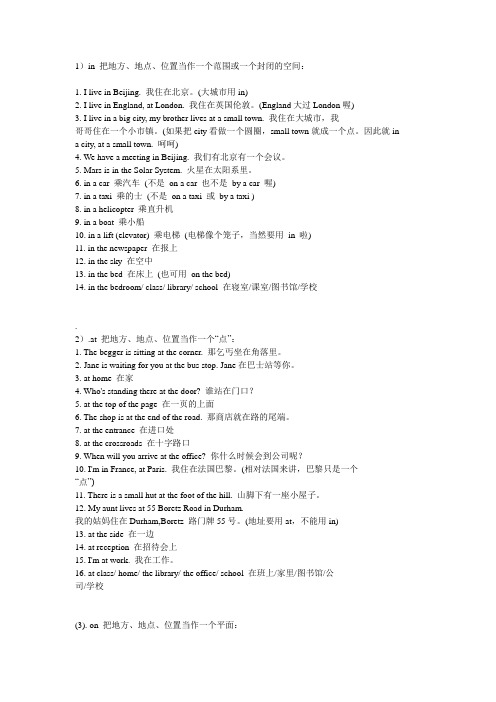
1)in 把地方、地点、位置当作一个范围或一个封闭的空间:1. I live in Beijing. 我住在北京。
(大城市用in)2. I live in England, at London. 我住在英国伦敦。
(England大过London喔)3. I live in a big city, my brother lives at a small town. 我住在大城市,我哥哥住在一个小市镇。
(如果把city看做一个圆圈,small town就成一个点。
因此就ina city, at a small town. 呵呵)4. We have a meeting in Beijing. 我们有北京有一个会议。
5. Mars is in the Solar System. 火星在太阳系里。
6. in a car 乘汽车(不是on a car 也不是by a car 喔)7. in a taxi 乘的士(不是on a taxi 或by a taxi )8. in a helicopter 乘直升机9. in a boat 乘小船10. in a lift (elevator) 乘电梯(电梯像个笼子,当然要用in 啦)11. in the newspaper 在报上12. in the sky 在空中13. in the bed 在床上(也可用on the bed)14. in the bedroom/ class/ library/ school 在寝室/课室/图书馆/学校.2).at 把地方、地点、位置当作一个“点”:1. The begger is sitting at the corner. 那乞丐坐在角落里。
2. Jane is waiting for you at the bus stop. Jane在巴士站等你。
3. at home 在家4. Who's standing there at the door? 谁站在门口?5. at the top of the page 在一页的上面6. The shop is at the end of the road. 那商店就在路的尾端。
in和on和at的用法

in和on和at的用法In、On和At的用法In、on和at是英语中常用的介词,它们在不同的场合有不同的用法。
正确使用这些介词可以使我们的表达更加准确、清晰。
本文将详细介绍in、on和at的用法。
一、in的用法1. 表示位置(1)表示在某个范围之内:例:She is in the room.(她在房间里。
)(2)表示在某个地方或场所:例:I am in the park.(我在公园里。
)2. 表示时间(1)表示季节、月份、年份等长时间段:例:I was born in 1990.(我出生于1990年。
)(2)表示一天中的具体时间段:例:I always have breakfast in the morning.(我总是在早上吃早餐。
)3. 表示状态或情况(1)表示身体或精神状态:例:She is in good health.(她身体很健康。
)(2)表示情感状态:例:He is in love with her.(他爱上了她。
)二、on的用法1. 表示位置(1)表示在物体表面或靠近物体表面:例:The book is on the table. (书放在桌子上。
)(2)表示交通工具上:例:I am on the bus.(我在公交车上。
)2. 表示时间(1)表示具体的某一天:例:I will see him on Monday.(我会在星期一见他。
)(2)表示特定的节日或纪念日:例:We celebrate Christmas on December 25th.(我们在12月25日庆祝圣诞节。
)3. 表示状态或情况(1)表示进行中的活动:例:He is on the phone now.(他正在打电话。
)(2)表示某种运动或比赛:例:She is on the basketball team.(她是篮球队员。
)三、at的用法1. 表示位置(1)表示具体的地点或建筑物:例:We met at the station. (我们在车站见面了。
at和on和in的用法及区别
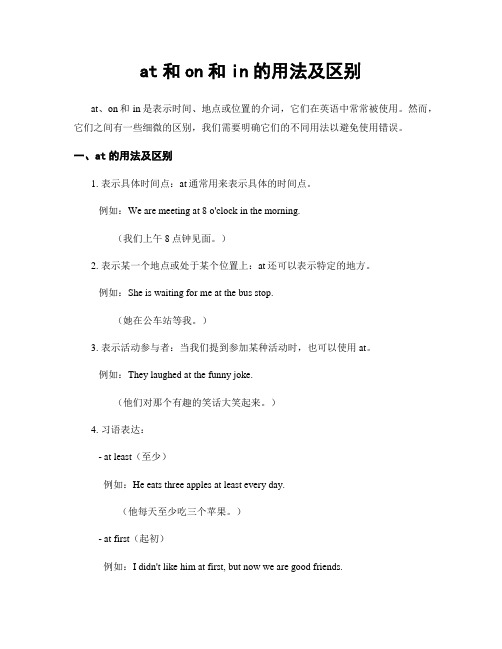
at和on和in的用法及区别at、on和in是表示时间、地点或位置的介词,它们在英语中常常被使用。
然而,它们之间有一些细微的区别,我们需要明确它们的不同用法以避免使用错误。
一、at的用法及区别1. 表示具体时间点:at通常用来表示具体的时间点。
例如:We are meeting at 8 o'clock in the morning.(我们上午8点钟见面。
)2. 表示某一个地点或处于某个位置上:at还可以表示特定的地方。
例如:She is waiting for me at the bus stop.(她在公车站等我。
)3. 表示活动参与者:当我们提到参加某种活动时,也可以使用at。
例如:They laughed at the funny joke.(他们对那个有趣的笑话大笑起来。
)4. 习语表达:- at least(至少)例如:He eats three apples at least every day.(他每天至少吃三个苹果。
)- at first(起初)例如:I didn't like him at first, but now we are good friends.(我起初不喜欢他,但现在我们是好朋友了。
)二、on的用法及区别1. 表示具体日期或星期几:on通常用来表示具体的日期或星期几。
例如:Your birthday is on December 21st.(你的生日是12月21日。
)2. 表示具体的特定天:当提到某一天时,我们常常使用on。
例如:I will see you on Monday.(星期一我会见你。
)3. 表示某种媒介或平台:on还可以表示媒介或平台。
例如:I read the news on the internet.(我在网上阅读新闻。
)4. 表示参加节庆、活动等特殊场合:当我们参加特殊的节庆、活动时,也使用on。
例如:We celebrate Christmas on December 25th.(我们在12月25日庆祝圣诞节。
介词on、in、at 的用法
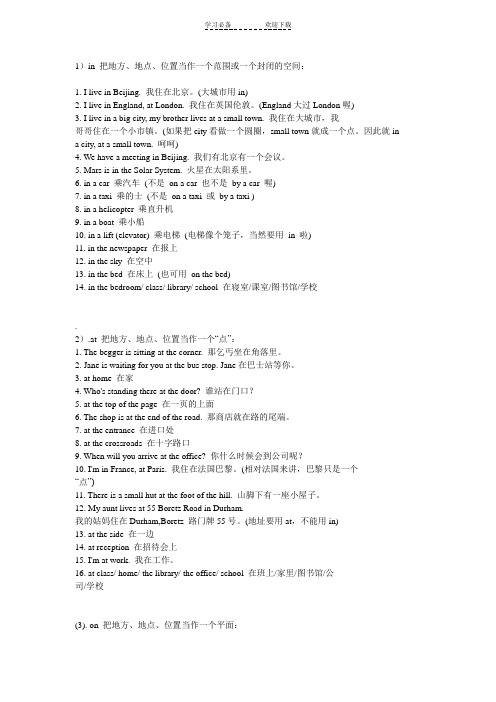
1)in 把地方、地点、位置当作一个范围或一个封闭的空间:1. I live in Beijing. 我住在北京。
(大城市用in)2. I live in England, at London. 我住在英国伦敦。
(England大过London喔)3. I live in a big city, my brother lives at a small town. 我住在大城市,我哥哥住在一个小市镇。
(如果把city看做一个圆圈,small town就成一个点。
因此就ina city, at a small town. 呵呵)4. We have a meeting in Beijing. 我们有北京有一个会议。
5. Mars is in the Solar System. 火星在太阳系里。
6. in a car 乘汽车(不是on a car 也不是by a car 喔)7. in a taxi 乘的士(不是on a taxi 或by a taxi )8. in a helicopter 乘直升机9. in a boat 乘小船10. in a lift (elevator) 乘电梯(电梯像个笼子,当然要用in 啦)11. in the newspaper 在报上12. in the sky 在空中13. in the bed 在床上(也可用on the bed)14. in the bedroom/ class/ library/ school 在寝室/课室/图书馆/学校.2).at 把地方、地点、位置当作一个“点”:1. The begger is sitting at the corner. 那乞丐坐在角落里。
2. Jane is waiting for you at the bus stop. Jane在巴士站等你。
3. at home 在家4. Who's standing there at the door? 谁站在门口?5. at the top of the page 在一页的上面6. The shop is at the end of the road. 那商店就在路的尾端。
介词on、in、at-的用法.
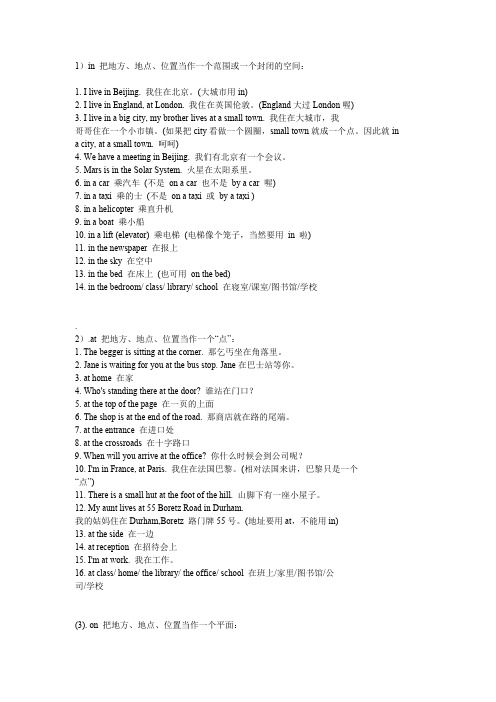
1)in 把地方、地点、位置当作一个范围或一个封闭的空间:1.I live in Beijing. 我住在北京。
(大城市用in)2.I live in England, at London. 我住在英国伦敦。
(England大过London喔)3.I live in a big city, my brother lives at a small town. 我住在大城市,我哥哥住在一个小市镇。
(如果把city看做一个圆圈,small town就成一个点。
因此就ina city, at a small town. 呵呵)4.We have a meeting in Beijing. 我们有北京有一个会议。
5.Mars is in the Solar System. 火星在太阳系里。
6.in a car 乘汽车(不是on a car 也不是by a car 喔)7.in a taxi 乘的士(不是on a taxi 或by a taxi )8.in a helicopter 乘直升机9.in a boat 乘小船10.in a lift (elevator) 乘电梯(电梯像个笼子,当然要用in 啦)11.in the newspaper 在报上12.in the sky 在空中13.in the bed 在床上(也可用on the bed)14.in the bedroom/ class/ library/ school 在寝室/课室/图书馆/学校.2).at 把地方、地点、位置当作一个“点”:1.The begger is sitting at the corner. 那乞丐坐在角落里。
2.Jane is waiting for you at the bus stop. Jane在巴士站等你。
3.at home 在家4.Who's standing there at the door? 谁站在门口?5.at the top of the page 在一页的上面6.The shop is at the end of the road. 那商店就在路的尾端。
on in at的用法

on in at的用法1.表示时间,注意以下用法:(1)表示时间的某一点某一时刻或年龄等用at。
(2)泛指一般意义的上午、下午或晚上以及月或年等较长的时间,-般用in。
(3)若表示星期几或某一特定的日期,则用on。
2.表示地点场所、位置等,注意以下用法:(1)表示某一点位置,用at。
(2)表示空间或范围,用in.(3)at与in的另一个区别是: at 于指较小的地方,而in用于指较大的地方。
(4)介词on用于地点,主要指在某物的表面。
at the supermarket和in the supermarket的不同at the supermarket和in the supermarket的不同是: in用来表示大体的地方,at表示在具体的位置。
in是通常用于表示在.....里;在.....地方;在.....期间,也经常表示一种“在”的含义。
on通常表示.....向;.....对;.....上,是一种计划进行时的语态。
at最经常用的就是“.....在”。
第一,介词in,on,at表示时间时的用法区别in时间长;on某一点;at时间短。
①in时间范围大(一天以上)如:in Tanuary,in winter,in 1999;泛指在上午,下午,晚上,如:in the morning(afternoon, evening).②on指在某一天或某一天的上午,下午,晚上,如:on Monday,on Sunday afternoon,on July 1,1999③at时间最短,一般表示点时间,如at six o’clock,at three thirty.习惯用法:at night, at noon,at this time of year.第二,介词in,on,at表示地点时的用法区别at强调点,on强调面,in强调在里面。
介词on in at的用法口诀
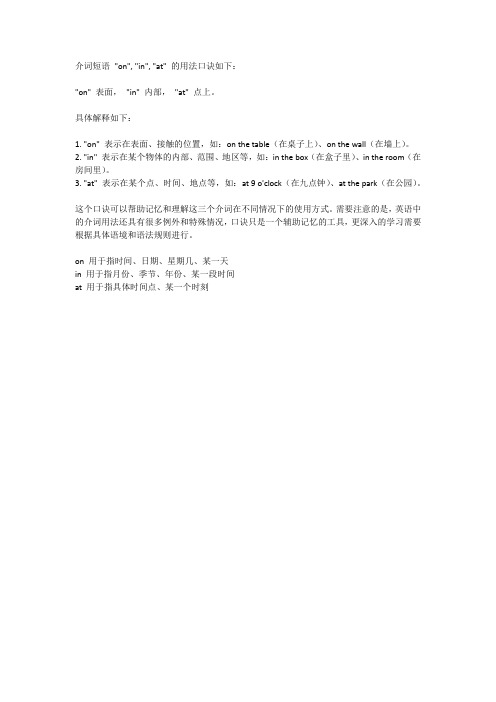
介词短语"on", "in", "at" 的用法口诀如下:
"on" 表面,"in" 内部,"at" 点上。
具体解释如下:
1. "on" 表示在表面、接触的位置,如:on the table(在桌子上)、on the wall(在墙上)。
2. "in" 表示在某个物体的内部、范围、地区等,如:in the box(在盒子里)、in the room(在房间里)。
3. "at" 表示在某个点、时间、地点等,如:at 9 o'clock(在九点钟)、at the park(在公园)。
这个口诀可以帮助记忆和理解这三个介词在不同情况下的使用方式。
需要注意的是,英语中的介词用法还具有很多例外和特殊情况,口诀只是一个辅助记忆的工具,更深入的学习需要根据具体语境和语法规则进行。
on 用于指时间、日期、星期几、某一天
in 用于指月份、季节、年份、某一段时间
at 用于指具体时间点、某一个时刻。
关于in,at,on的用法

关于in,at,on的用法一、in, at, on的基本用法In, at 和 on 是英语中常见的介词,它们在句子中具有很多不同的用法和含义。
以下将详细探讨这些介词在时间、地点和场景上的用法,以帮助更好地理解和运用它们。
二、时间方面的使用1. InIn 用于表示年份、季节、月份或一天内某个时间段。
例如:- She was born in 1990.- They usually go skiing in winter.- We will have a meeting in April.- He called me in the morning.2. AtAt 用于表示一个明确的时刻或特定时间(如小时、钟点)。
例如:- The concert starts at 7 PM.- I usually have lunch at noon.- We will meet at three o'clock.注意:at 不适用于较长的时间段。
3. OnOn 通常与具体日期搭配使用。
例如:- Our anniversary is on June 15th.- The party is on Saturday.同样,on 不适用于较长的时间段。
三、地点方面的使用1. InIn 表示相对较大范围的区域或地点。
例如:- She lives in Canada.- There are beautiful beaches in Hawaii.2. AtAt 表示一个具体位置或特定场所。
例如:- Meet me at the park after school.- He works at a hospital.3. OnOn 常用于具体的物体表面或较小范围的地点。
例如:- The book is on the table.- There is a pen on his desk.四、场景方面的使用1. InIn 表示在某种情境或状态中。
- 1、下载文档前请自行甄别文档内容的完整性,平台不提供额外的编辑、内容补充、找答案等附加服务。
- 2、"仅部分预览"的文档,不可在线预览部分如存在完整性等问题,可反馈申请退款(可完整预览的文档不适用该条件!)。
- 3、如文档侵犯您的权益,请联系客服反馈,我们会尽快为您处理(人工客服工作时间:9:00-18:30)。
at,on和in是表示时间的常用介词,用好这三个时间介词,可以先抓住一个大的原则,即at某时刻, on某天, in某段时间,时间的跨度是由小到大。
选用介词at的场合:
用于钟点前
·at ten o’clock
·at a quarter to six
用于时刻前
·at noon/night/midnight(半夜)
·at sunrise(日出时)
·at dusk(黄昏)
·at dawn/daybreak (黎明)
eg:We will leave at daybreak.我们将在黎明时动身。
用于表示进餐时间。
如:
·at breakfast/lunch/supper(在早餐时/午餐时/晚餐时)
eg:He drinks tea at breakfast.他在早餐时饮茶。
用于表示年龄时。
如:·at 14 (=at the age of 14在14岁) eg:He left home at the age of 16.他十六岁离开了家。
用于一些固定短语或习惯搭配中。
如:
·at Christmas
·at New Year
·at Thanksgiving(感恩节)
·at the beginning/end of last month
·at the moment/ at that time
·at this time of day
·at a bad time of year
·at first(起初)
·at last(终于)
选用介词on的场合:
用于星期、日期(包括该天的各部分)前
·on Sundays/weekdays
·on Monday morning / afternoon / evening
eg:I'm flying home on Sunday afternoon.我星期四下午乘飞机回家。
“在周末”既可以说at weekends,也可以说on weekends eg:I often go fishing on/ at weekends.我经常在周末去钓鱼。
用于morning/afternoon/evening/night/day前,此时这类名词前多有修饰语或带有of等引起的后置修饰语,指具体的或不具体的某一日
·on a cold afternoon
·on the night of October 1, 1997
·on the first day
·on his birthday
·on Friday afternoon
用于公共节假日前:
·on Teachers’ Day
·on Christmas Day/Eve
·on National Day
特别注意:
at,on都可用来表示“节假日”,但at侧重指“休假的时节”,而不是指具体的哪一天;on侧重指具体的时日,与它连用的短语中多含“Day”
·at New Year(在新年期间)
·at Christmas (在圣诞节期间)
·on New Year’s Day(在元旦那天)
·on Christmas Day (在圣诞节)
选用介词in的场合:
用于泛指一天的上午、下午、傍晚
如:in the morning/afternoon/evening/night
用于某个较长的时间,像世纪、朝代、年、月、季节
·in March
·in spring
·in 1997
·in the twenty-first century(在二十一世纪)
·in one’s fifties(在某人50多岁时)
用于表示“从现在起,多久以后或多长时间内”的短语之前
She’ll see me again in a week’s time.一周后她再来看我。
I can draw a beautiful horse in five minutes.
我可以在五分钟内画好一匹好看的马。
There are seven days in a week.一周有七天。
省略介词的情况:
有些情况,既不用in,也不用on和at,时间前面可不带介词。
家长可以让孩子认清标志,注意哪些情况下要省略介词,避免画蛇添足。
next,last,this,that与时间名词连用作状语时
We’re going to work on a farm next Sunday.下个星期天,我们要去农场劳动。
They visited the Great Wall last year.去年他们参观了长城。
today, tomorrow, yesterday, the day before yesterday,等之前
Are you free tomorrow night? 明晚你有空吗?
Where did you go the day before yesterday? 前天你去哪儿了?。
